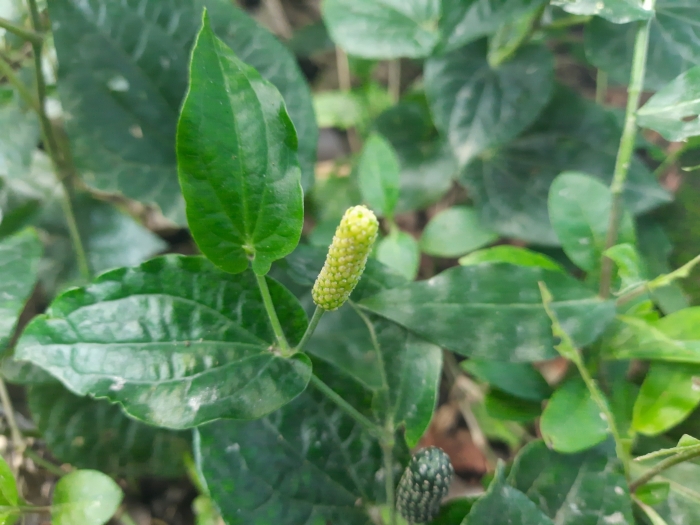Long Pepper
(Piper longum)
Long Pepper (Piper longum)
/
/

© মহা বিদ্রোহী BUT রণ ক্লান্ত
CC BY 4.0
Image By:
© মহা বিদ্রোহী BUT রণ ক্লান্ত
Recorded By:
Copyright:
CC BY 4.0
Copyright Notice:
Photo by: © মহা বিদ্রোহী BUT রণ ক্লান্ত | License Type: CC BY 4.0 | License URL: http://creativecommons.org/licenses/by/4.0/ | Uploader: le_verrier | Publisher: iNaturalist |

























Estimated Native Range
Summary
Piper longum, commonly known as Long Pepper, is a perennial, semi-woody vine native to the tropical regions of South Asia, including India, and Southeast Asia, particularly Java, Indonesia. It thrives in the understory of lowland tropical forests and along forest edges where it receives dappled sunlight. The plant can grow up to 4 meters in length and has a climbing habit, using its aerial roots to attach to supports. The Long Pepper produces small, inconspicuous white flowers that develop into elongated fruit spikes resembling hazel catkins. These fruit spikes are harvested before maturity, dried, and used as a spice. The fruits are known for their sweet, complex flavor and contain the compound piperine, which contributes to their pungency.
Long Pepper is valued for its culinary and medicinal properties. It is less common than black pepper but is still used in Indian, Nepalese, and Southeast Asian cuisines for its unique flavor. In cultivation, Long Pepper requires a warm, humid environment, consistent moisture, and well-draining soil. It prefers partial shade but can tolerate some direct sunlight. The plant is not commonly grown in home gardens but is of interest for its historical significance and potential health benefits. It has been used in traditional medicine for its purported anti-inflammatory and digestive properties. However, it is not widely cultivated outside its native range and can be difficult to find in general nurseries.CC BY-SA 4.0
Long Pepper is valued for its culinary and medicinal properties. It is less common than black pepper but is still used in Indian, Nepalese, and Southeast Asian cuisines for its unique flavor. In cultivation, Long Pepper requires a warm, humid environment, consistent moisture, and well-draining soil. It prefers partial shade but can tolerate some direct sunlight. The plant is not commonly grown in home gardens but is of interest for its historical significance and potential health benefits. It has been used in traditional medicine for its purported anti-inflammatory and digestive properties. However, it is not widely cultivated outside its native range and can be difficult to find in general nurseries.CC BY-SA 4.0
Plant Description
- Plant Type: Shrub, Vine
- Height: 9.75-33 feet
- Width: 6.5-13 feet
- Growth Rate: Slow
- Flower Color: Green, Yellow
- Flowering Season: Summer, Fall, Winter
- Leaf Retention: Evergreen
Growth Requirements
- Sun: Full Sun
- Water: Medium
- Drainage: Medium
Common Uses
Edible*Disclaimer: Easyscape's listed plant edibility is for informational use. Always verify the safety and proper identification of any plant before consumption., Low Maintenance
Natural Habitat
Native to the understory of lowland tropical forests and along forest edges in South Asia and Southeast Asia
Other Names
Common Names: Long pepper, Pippali, Bi Bo, Jaborandi Pepper
Scientific Names: , Piper longum, Chavica longa, Chavica roxburghii, Piper latifolium, Piper roxburghii, Piper sarmentosum, Piper turbinatum,
GBIF Accepted Name: